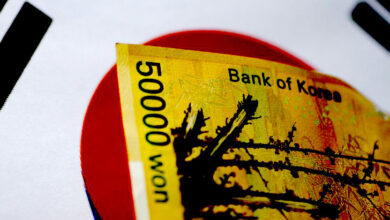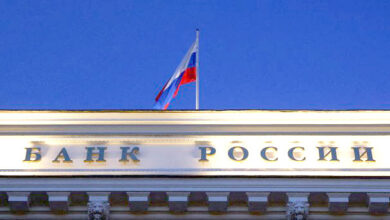As a recession seems likely, British businesses send out SOS calls for loans.

As inflation soars and a recession looms, many British businesses are having trouble getting bank loans at reasonable rates. This puts more pressure on the UK government as it prepares to release a budget meant to boost the economy.
Hall Hunter, a British fruit grower, is one of thousands of businesses in Britain that are struggling. Its owner, Harry Hall, is forced to think about taking the drastic step of lending to his own successful company to make up for its expensive bank loans.
Hall, who can’t get a loan product from his bank to lower his high borrowing costs, said, “I’m probably going to be the bank.” He told Reuters that he would probably put some of his own money into his business to protect it from 11.1% inflation and a recession that could last up to two years.
Related: A U.S. appeals court temporarily prohibited Biden’s plan to cancel student loans.
According to data collected by Reuters and interviews with lenders and business leaders, banks are getting more nervous about lending money to small businesses. This is because the rising costs of debt, labour, and raw materials make the business case for lending to small businesses more difficult than ever.
A Bank of England (BoE) survey released last month showed that lenders expect the amount of credit given to small businesses with annual sales of less than £1 million to drop by 10.9% in the last three months of this year.
This could be a problem for the new prime minister, Rishi Sunak, and the finance minister, Jeremy Hunt, who will announce a new, more austere financial plan on Thursday. They want to stabilise the economy after their short-lived predecessors threw the financial markets into chaos by planning tax cuts that couldn’t be paid for.
Any trouble for Britain’s small businesses, which often don’t have enough customers to pass on cost increases as easily as their larger competitors, could be a new blow to the economy.
According to the Federation of Small Businesses (FSB), small firms with up to 49 employees account for 48% of private sector jobs and about 1.6 trillion pounds, or 36%, of turnover. This is based on data from the government.
Martin McTague, who is the head of the Financial Stability Board (FSB), told Reuters that he met with Sunak and Hunt last Friday to ask for more financial help for small businesses.
“How will we get out of this mess if small businesses don’t help?” “Those parts of the economy that have been hit the hardest by the pandemic are having a hard time getting banks to help them,” he said.
“MAKE OR BREAK” FOR THE ECONOMY
Banks are still lending money, but the risks and higher costs of giving money to small businesses, many of which may not last, mean that banks often have to turn them down, according to four senior banking industry sources.
Stephen Pegge, who is in charge of commercial finance at the bank lobby group UK Finance, said that there was evidence that small and medium-sized businesses (SMEs) were getting credit. For example, BoE data shows that in September, banks lent 6.5 billion pounds to companies with less than 25 million pounds in sales.
“There is no doubt that lending is happening,” Pegge said. “But it’s clear that small businesses can’t borrow as much as they used to because the economy is slowing down.”
According to a quarterly survey of 1,383 small business owners by the FSB, this is the worst time since 2015 for small businesses in Britain to get loans.
The survey found that 42% of funding requests were denied in the third quarter, which is up from 39% in the second quarter of the year. Also, 1 in 5 firms that asked for funding were given loan offers with interest rates higher than 11%.
Many small businesses have yet to pay back state-backed loans that helped them get through COVID lockdowns. This makes their credit profiles even worse. As of July 31, only 4.7 billion pounds of the 46 billion pounds that were given to small businesses through the “Bounce Back Loan” scheme had been paid back in full.
Claire Burden, a partner in advisory consulting at Evelyn Partners, said that business owners are having to look for other ways to get money. One of those ways is to take money out of their own pockets.
Others, like Douglas Grant, CEO of Manx Financial Group, called for a permanent state-backed loan scheme to protect SMEs. He said this could be the “fundamental difference between make or break for many companies and, in turn, our economy.”
“BANKS DO NOT HAVE A CHOICE.”
Naresh Aggarwal, associate director of policy at the Association of Corporate Treasurers, which represents business finance staff, said that banks were being realistic about lending as the economy slowed down to avoid having to do expensive writedowns.
Loans are still being given out, and companies that break the rules about their debts are being let off the hook, but this help isn’t free.
“The interest rate on the loan is going up,” he said. “And most businesses can’t do anything else.” “It’s not a way to take advantage of people,” Aggarwal said.
Related: Sri Lanka will keep its “middle-income” status, but it will ask for cheaperloans. loans.
Some of the biggest banks have already put aside hundreds of millions of pounds to cover possible losses.
Lloyds (LON:LLOY) gave the most detailed breakdown for the July-September quarter. It showed that the most serious category of problem loans in its small business unit went up by 30% compared to the end of 2021. This suggests that banks may want to be cautious.
More and more companies of all sizes are already giving in to the stress. In England and Wales, the number of companies that went bankrupt between April and June was the highest it has been in almost 13 years, according to official data released last month.
One in four small businesses has thought about shutting down because of rising costs, according to a survey of 1,930 businesses done in September by the business bank Tide.
The head of the London Chamber of Commerce and Industry, Richard Burge, said that it is hard for businesses to show that they are still good businesses. “But they will only be financially stable if they can get the loans they need.”
($1 = 0.9843 euros)





